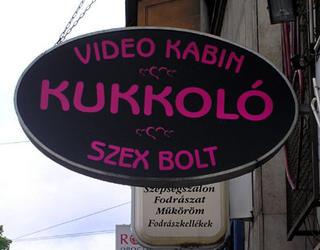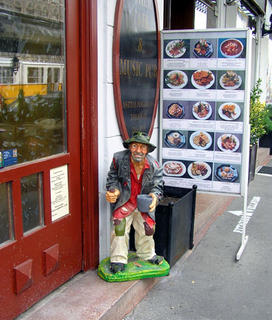Today I was telling a friend about my first meal in Budapest, when my friend and I had goulash. I wrote about it here at the time, but didn't give details. I did briefly mention the problem we had with the 'garnish,' and that is what I was telling my friend about today.
She wanted to understand, and when I explained that I didn't understand it myself, she suggested writing about it on the blog. "Maybe someone will be able to explain what it meant," she said. She seems to think I have a large readership (ha!) which includes people familiar with Hungarian food and language. Well, of COURSE. Only clever, worldly-wise people read my blog!
So here's the story that requires explaining.
As I mentioned in the original post, we were walking around looking for food in the wrong end of town, something we realized when we passed a szex shop. (And you thought I'd lost my spelling prowess, didn't you? I hadn't. I was being SCRUPULOUSLY accurate. And it wasn't the tricky keyboard, either.)
Right next to the szex shop there was a place that looked kind of like a restaurant, but it also had a big 'Health Club' sign up outside. I did not take a picture of it that evening, but did take one the next day, when it was clearly a restaurant and the Health Club sign had gone. That restaurant sign was not there at night.
Inside you could see a few tables and chairs, but it was very, very dimly lit, and we were peering through the window trying to see if it was open or not when a waiter came out. We asked him if this was a restaurant, and if it was, was it open?
"Yes," he said, and whisked us inside. He did this so fast and authoritatively we didn't really have a choice. Also, he was gorgeous, and we were totally disarmed by his dimples. (I suspect that if he'd ushered us into the szex shop we would have gone like sheep.)
Inside, we were taken through the darkened room with the tables and chairs, which was empty, and through into a larger room in the back, which turned out to be... a restaurant! Down the back of the room there was a large sign with an arrow pointing to the "Health Club," which was apparently through the back of the restaurant. The sign had a picture of a man flexing his muscles. The rest of the restaurant looked like a normal restaurant, if somewhat run-down, except that one wall was covered in revolutionary pictures.
I took photos when the waiter wasn't looking, which was frequently. He kept disappearing, and there were very few other customers. (I wanted to take a picture of the waiter, too, but was a little concerned about how that request would be taken. I mean, it felt kind of wrong for a couple of women who'd been wandering the szex shop area of town to ask a hunk if they could take his photograph, and I was feeling a little intimidated already.)

The waiter brought the menu, which was HUGE. It went on for pages and pages. It was not a normal menu. It was a novel.
We settled down to study it. Fortunately for us, there were English translations alongside some of the Hungarian. Have you ever seen Hungarian? Do they have to try to get every letter of the alphabet into every word, do you think? 
Unfortunately the menu translations had been done by someone whose command of English was somewhat wobbly.
We decided that since we were in Hungary, we should have goulash. That was easy. However, goulash was listed as a starter, and we wondered how big it was. We asked, and the waiter told us it was a starter. We asked how big the dish was, and he told us it was the usual size. This was not very informative, but he was reaching the end of his English so we decided to order something else as well, just in case, but not a main. (Actually I can't remember if we ever got that far in the menu anyway.)
We found a couple of pages dedicated to garnish.
"Garnish?" we asked each other. "Is there some other use of the word 'garnish' that we don't know about?"
The menu was not helpful. I can't remember if that part of it had the English translations (some parts didn't) or whether it was just unusually obscure translations, but we couldn't figure out what 'garnish' was supposed to mean. We decided to ask our long-suffering waiter again.
"What is garnish?" we asked him.
"It is..." he waved his arms helplessly and shrugged, "...It is GARNISH."
We frowned. Then we pointed to one menu item in the 'garnish' list.
"How about this," we said. "What is it?"
"Oh no, you don't want that. It's noodles," he said.
"Noodles?" we said. "Sounds good!"
"But it's NOODLES," he said. We asked for further explanation but ran into language problems again. He clearly did not want us to have the noodle garnish, but we could not extract information about what would be a suitable other dish. But he was so against the garnish it was making us curious, so in the end we told him firmly that we wanted the goulash, a salad, and the noodle garnish. Oh, and a bottle of wine.
He looked exasperated with our choice, but gave up trying to convince us that noodles were a bad idea. His expression said that we were making a horrible mistake. He'd tried to stop us but we just wouldn't listen. You could see him metaphorically washing his hands of us as he left the table.
We sat thoughtfully, pondering what could be so awful about noodles, and after a while the goulash appeared (BIG bowls), along with a large basket of bread and the wine. We tasted it all, and it was FABULOUS. Exactly what we wanted, and quite clearly enough for our needs. (If that goulash was a starter Hungarian people eat like sumo wrestlers. I think that must have been another menu translation glitch.)
Eventually the salad appeared, which was satisfactory, and the 'garnish,' which was decidedly odd. It was not noodles. It was... I don't know what to call it. It might have started off as noodles, I suppose, but if so, the noodles had been chopped into bits, about rice-sized. It was made of some kind of pastry, or dumpling-type material. The plate was huge, and there was a MOUNTAIN of this stuff. The waiter had a told-you-so expression as he delivered it and almost but not quite rolled his eyes as he departed, probably to have a giggle in the kitchen about the idiot tourists.
We stared at the plate.
"Noodles?" I said. "NOODLES?"
"Well, I suppose we should try it," my friend said, doubtfully. We were both full already, from the wonderful goulash, and there was still bread and wine left. And salad.
We dipped our forks into the mountain.
It was remarkable. It had NO FLAVOUR AT ALL. It was like ... chopped up cooked dumpling dough, with no sauce, no salt, and no taste. It was not noodles. It was not garnish. It barely qualified as 'food,' although it would have made great landfill.
Our 'garnish' sat on the table for the rest of the meal, a hard-to-ignore reminder of the lesson we had just learned. LISTEN TO THE WAITER'S ADVICE, EVEN WHEN HE DOES NOT MAKE SENSE.
I wish I'd taken a photo of the noodles, but I didn't, and nor did I note the Hungarian name. I was too busy regretting having ordered it.
But I really would like to know two things:
1. What is garnish, in Hungary? That was no sprig of parsley!
2. What WAS that stuff, and how are you supposed to eat it?
Any ideas?
Monday, October 10, 2005
Garnish
Posted by
Badaunt
at
1:21 am
7
comments
![]()





7 comments:
I am not postive, but I think I know what you are talking about. I have seen something similiar in Sweden served in place of pasta. I think they have a kind made out o rice, a kind made out of potato and a kind made out of wheat that would sort of be like mushed up dumplings. It always has a sauce on it though. Maybe there are sauces you can order to go with it or something? Sounds really weird to just get a big plate of unsalted, unflavored starch specks.
I'll admit to being a little clever, but I am not worldy-wise at all, so I have no idea what this was. Sounds icky.
That store sign looks a little like the word verifications!
I think if you had gone down one more hallway, you would have discovered that the restaurant-health club was connected to the szex shop!
I learned this early on while traveling...when I was in Italy, I tried to order some pasta and ended up getting something entirely awful because it was not translated correctly on the menu. It was some kind of awful veal in a "blood sauce." Not so good for the somewhat-vegetarian. The waiter kept trying to suggest something else, but I was being experimental. I will never doubt the staff again. :)
I'm so glad I've found your blog. Your stories are hilarious and wonderfully written. I think I would have a lot of fun hanging out with you. There were several lines in this story which made me laugh out loud, the best of which may have been "Our 'garnish' sat on the table for the rest of the meal, a hard-to-ignore reminder of the lesson we had just learned. LISTEN TO THE WAITER'S ADVICE, EVEN WHEN HE DOES NOT MAKE SENSE."
So, with all those nice things said, it's with a heavy heart that I ffel I have to now tag you. To learn the details of this horrible fate, go read this
I think garnish meant: "something that goes along with the main course." In other words, a side dish. Somebody translating this got confused about the idea of something on the side.
This is just a filler food, like kasha, served in countries where there is not historically enough of the "good stuff" to fill you up. Farfel is another.
Exzellent sztory.
I didn't know either....but a little research revealed:
The first thing that people recall about Hungarian cuisine is goulash, which is, contrary to popular belief , not a stew but an artistically prepared thick soup.
You are not advised to accept the waiter’s offer about the speciality of the house, particularly if you do not know the price. You should study the menu and find out whether the main course includes the price of garnishes.
If garnishes (koretek) such as rice, pommes frites, burgonya (potatoes) or zoldseg (vegetables) are individually listed in a separate section of the menu, it probably means they’re not included with the main plate and will cost extra, though main courses always include some sort of garnish.
--so the waiter must have been flummoxed by people ordering an hors d'oeuvre, a salad and a starchy side dish......
Post a Comment